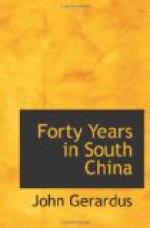“In the latter half of the year 1851, some of the Christians from Peh-chui-ia went to the large town of Chioh-be on business and preached the Gospel as they had opportunity. They found a few persons who listened to their message with interest and manifested a desire to hear more. When this fact, on their return, was reported to the churches of Peh-chui-ia and Amoy, other Christians went to Chioh-be. A great interest was awakened. A small house was rented for a chapel. This house was thronged every day throughout the day and evening. Soon as we had opportunity we visited the place to converse with inquirers and examine candidates for baptism. In January, 1855, the first converts at that place were baptized. The interest continued to increase. We found the premises we had rented entirely too small. As soon as a larger and more suitable place could be found it was secured. Soon after this a violent persecution broke out. The immediate effect was greatly to hinder the work. Only those who were sufficiently interested in the Gospel to raise them above the fear of man dared attend the place of worship. Still there has been constant progress.
“If the churches gathered by us are to be organized simply with respect to the glory of God and their own welfare, there is a fact in our circumstances which should have great weight in forming this organization. This fact is the intimate relation and hitherto oneness of the churches under our care and under the care of the missionaries of the English Presbyterian Church. In the foregoing short history of our work it will be seen that we have been and are closely connected with the missionaries of that Church. From the first we have had the pastoral care of their church gathered at Peh-chui-ia and in the surrounding region. They have not attempted the organization of any church at Amoy. By far the greater proportion of their influence and labors at Amoy has been in the direction of assisting us in our work. They have acted as though they thought it was of no importance whatever whether converts were received into church fellowship by us or them. Doubtless the church members, although perfectly aware that we and our English Presbyterian brethren are of different Churches and different countries, suppose that they form but one Church. When the time had arrived for a regular organization of our church in Amoy, the question presented itself: Shall we invite Mr. Douglas, then and still the only English Presbyterian missionary at Amoy, to unite with us in our deliberations? By the providence of God our missions had been brought closely together. We had been laboring together in the work of the Lord, were one in sympathy, held the same views in theology, and did not differ in regard to church polity. But one answer could be given to this question. We cordially invited him. He as cordially accepted of our invitation, and heartily engaged with us in our church meetings, held in reference to the election




